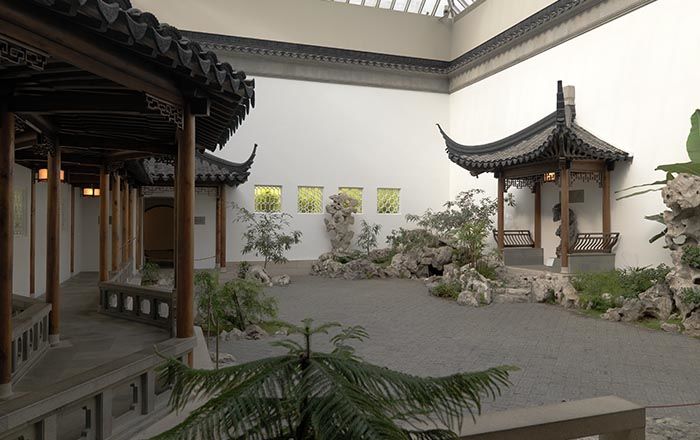Returned to lender The Met accepts temporary loans of art both for short-term exhibitions and for long-term display in its galleries.
Two Pages from the Ishiyama-gire
Attributed to Fujiwara no Sadanobu Japanese
Not on view
In palace circles, when making a gift of an anthology of poetry, no expense was spared to make sure it met the highest standards of aesthetic refinement. The quintessential demonstration of this concern was the transcription of the Anthology of Poems of Thirty-six Poetic Immortals, thought to have been commissioned in 1112 to celebrate the sixtieth birthday of Emperor Shirakawa (1053–1129). All thirty-four original volumes, and the five volumes added at a later date, represent the styles of the day, some conservative and others up-to-date, like the example here. What made this anthology stand out is its remarkable array of decorated writing papers. Some are brightly colored; others were created using a collage technique; and still others, as here, replicate motifs from Chinese examples. The roundels with lions surrounded by chrysanthemums were woodblock printed in mica, and the bird and floral motifs were painted in a mixture of ink and silver pigment.
Viewed here are two separate pages from the anthology, mounted together as a hanging scroll. The poetry is inscribed in the bold kana (phonetic script) usually associated with Fujiwara no Sadanobu, a fifth-generation direct descendent of Fujiwara no Yukinari (972–1027), who is recognized as the founder of the Sesonji Lineage of court calligraphers. The poems read:
Shiga no yamagoe nite yama no i ni / onna no te
araite musubi-te / nomu o mite yomite yareru
Along the mountain pass of Mount Shiga, after
watching a young woman wash her hands and cup
them to drink water from a mountain spring, I
composed this poem and presented it to her:
Musubu te no
shizuku ni nigoru
yama no i no
akade mo hito ni
wakarenuru ka na .
Drops from cupped hands
muddy a mountain spring,
like a polluted offering,
as my thirst remains unslaked
when she departs.
Kugatsu kokonoka Mibu no Tadamine ga moto
yori
On the ninth day of the ninth month, composed by
Mibu no Tadamine.
Oru kiku no
shizuku o ōmi
wakayu chō
nureginu o koso
oi no mi ni kire
They say drops of dew
on chrysanthemums
make an elixir of long life,
while this aged body of mine
is dampened by rumors.
—Trans. John T. Carpenter
Due to rights restrictions, this image cannot be enlarged, viewed at full screen, or downloaded.

